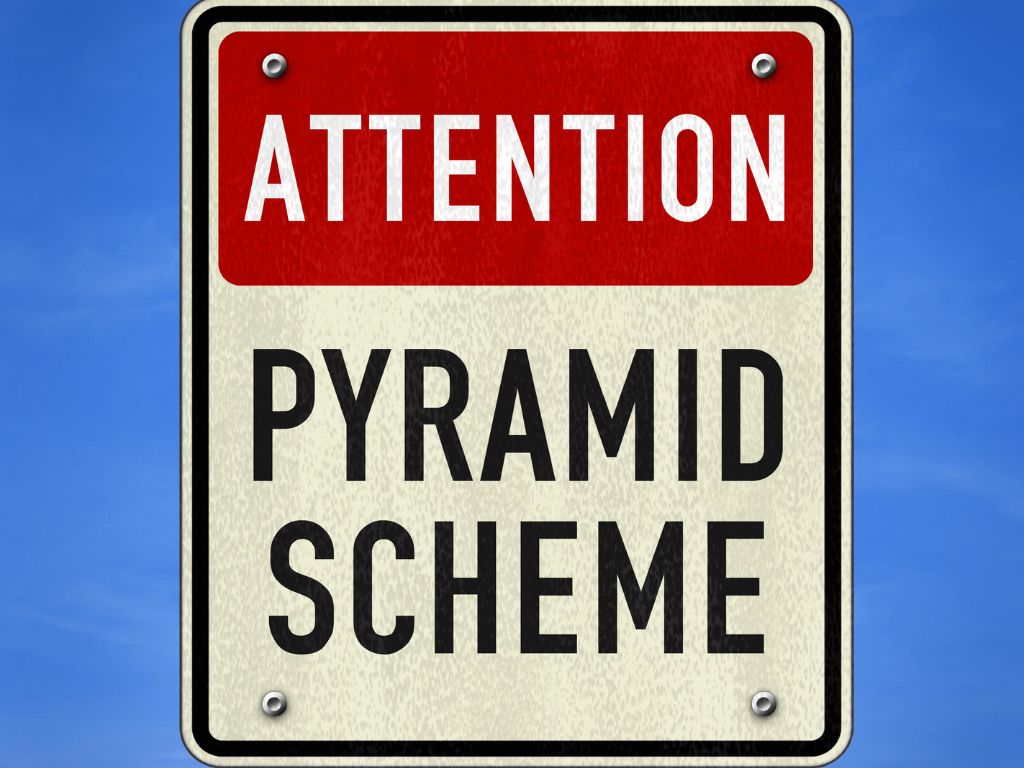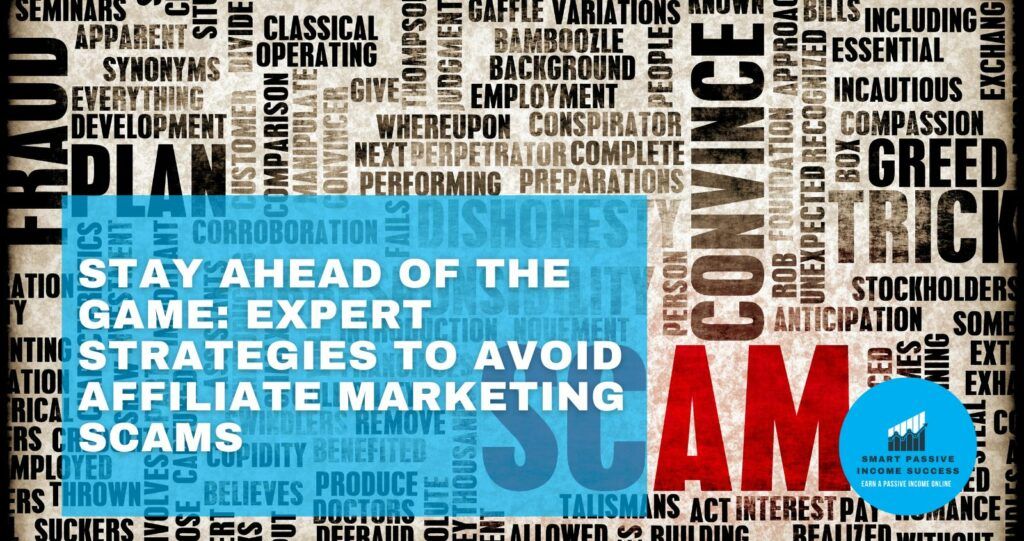Affiliate marketing can be an incredibly lucrative business, with the potential to earn passive income and build a successful career as an affiliate marketer. However, as with any industry, some seek to take advantage of unsuspecting individuals and undertake scams. If you’re new to affiliate marketing, or simply looking to protect yourself from potential scams, it’s important to stay ahead of the game and be aware of the expert strategies for avoiding affiliate marketing scams.
In this article, we’ll explore the most common types of affiliate marketing scams and provide you with expert strategies for avoiding them. Whether you’re just starting out or you’re a seasoned affiliate marketer, this guide will equip you with the knowledge and tools you need to stay safe and succeed in the competitive world of affiliate marketing. So, let’s get started!
Table of Contents
Is Affiliate Marketing Legit?
Affiliate marketing is a type of online marketing where businesses partner with independent marketers (also known as affiliates) to promote their products or services. The affiliate earns a commission for every sale, lead, or click that results from their promotional efforts. This model allows businesses to expand their reach and increase sales while allowing affiliates to earn money by promoting products they believe in.
Affiliate marketing has become increasingly popular in recent years, with more and more businesses turning to this model as a way to drive sales and build brand awareness. In fact, according to a report by Saas Scout, affiliate marketing spending in the US is expected to reach $12 billion by 2023.
One reason for this growth is the legitimacy of affiliate marketing as a business model. Unlike other forms of marketing that rely on intrusive ads or pop-ups, affiliate marketing is a non-intrusive way to promote products to an interested audience. By partnering with affiliates who have established audiences, businesses can tap into a new customer base without resorting to aggressive marketing tactics.
Success stories abound in the world of affiliate marketing, with many affiliates earning six-figure incomes through their promotional efforts. For example, Pat Flynn of Smart Passive Income has built a successful business by promoting products he believes in and sharing his expertise with his audience. Similarly, Michelle Schroeder-Gardner of Making Sense of Cents has used affiliate marketing to build a successful blog and earn a full-time income.
While affiliate marketing can be a legitimate and lucrative business model, it’s important for both businesses and affiliates to approach it with integrity and transparency. By working together to create high-quality content and promote products that provide real value to customers, affiliates and businesses can build a mutually beneficial partnership that is built on trust and authenticity.
Most Common Types of Affiliate Marketing Scams to Avoid
There are many types of affiliate marketing scams you have to be on the look out for. I’ve listed the top 7 that you are most likely to come across. Vigilance is key and ensuring you are 100% confident you are signing up for the right thing is key… Before I give you tips on how to avoid these affiliate marketing scams, let’s talk through them first…
#1 Pyramid Schemes

These scams involve recruiting new affiliates to the program and earning commissions from their sales. The focus is on recruiting new affiliates, rather than selling products or services, which is a red flag. They usually hide behind a promise of a product or service, but the reality is that there isn’t one. Or, at least what they give you isn’t worth anything of value.
Pyramid schemes are illegal in most countries, and for good reason – they are often short-lived and leave participants with little to show for their efforts. For example, the infamous Ponzi scheme run by Bernard Madoff defrauded investors of over $65 billion before being uncovered in 2008. Pyramid schemes can be devastating for participants, as they often involve investing large amounts of money and time for little return.
#2 Fake Affiliate Programs

Scammers may create fake affiliate programs to lure unsuspecting affiliates into promoting their products. They may promise high commissions, but in reality, the products may not exist or may be of poor quality. To avoid these scams, it’s important to do research on the company and the products they offer and to read reviews from other affiliates.
In recent years, there have been a number of high-profile cases of fake affiliate programs being uncovered. For example, in 2017, the Federal Trade Commission shut down a fake affiliate program run by the company MOBE, which had allegedly scammed over $125 million from its affiliates. Fake affiliate programs can be difficult to spot, as they may use sophisticated marketing tactics to appear legitimate.
#3 Counterfeit Products

Some scammers may create counterfeit versions of popular products and offer them for sale through their affiliate program. Affiliates may unknowingly promote these products, which can damage their reputation and lead to legal issues. It’s important to thoroughly vet any products you promote and ensures they are legitimate and high-quality.
Counterfeit products are a major problem in the affiliate marketing industry and can cause serious harm to both affiliates and consumers. For example, in 2019, Amazon announced that it had spent over $500 million in the previous year to combat counterfeit products on its platform. In 2021, Amazon announced they “seized and destroyed” 2 million counterfeit products in 2020 to stop them from being sold on.
Counterfeit products can damage an affiliate’s reputation and lead to legal issues, and can also harm consumers who unwittingly purchase low-quality or dangerous products.
#4 Cookie Stuffing

This scam involves adding affiliate cookies to a user’s browser without their consent, which can lead to false commission claims. It’s important to only use legitimate affiliate links and avoid any programs that encourage cookie stuffing.
While cookie stuffing is technically illegal, it can be difficult to detect and prosecute. However, it can cause serious harm to legitimate affiliates, as it can result in false commission claims that can damage their relationships with merchants and affiliate networks.
#5 High-Pressure Tactics

Some affiliate programs may use high-pressure tactics to encourage affiliates to promote their products. They may promise huge commissions or threaten to cut off access to the program if the affiliate doesn’t meet certain targets. It’s important to be wary of any program that uses these tactics and to only work with companies that are transparent and respectful.
While high-pressure tactics are not necessarily illegal, they can be a warning sign of an unethical affiliate program. For example, some programs may threaten to withhold commissions or cut off access to the program if affiliates don’t meet certain sales targets. These tactics can be stressful and demotivating for affiliates and can harm their long-term success.
#6 Get-Rich-Quick Schemes

These scams promise quick and easy profits with minimal effort, but in reality, they are often pyramid schemes or other illegal activities. Affiliates should be wary of any program that promises huge profits with little work, as these are almost always too good to be true.
Get-rich-quick schemes are often advertised using flashy marketing tactics that promise huge profits with little effort. However, these schemes are almost always too good to be true and can cause serious financial harm to participants. For example, in 2020, the Federal Trade Commission shut down a get-rich-quick scheme called the “Success By Health” program, which had allegedly scammed over $7 million from its participants.
#7 Low-Quality Training Programs
Some affiliate programs may offer training products that promise to teach affiliates how to be successful marketers, but in reality, these products may be low-quality or outdated. It’s important to thoroughly research any training products before investing in them and to only work with companies that offer high-quality, up-to-date resources.
While not necessarily scams, low-quality training products can be a waste of time and money for affiliate marketers. For example, some training programs may promise to teach affiliates how to make huge profits quickly, but in reality, these programs may be outdated or ineffective. It’s important for affiliates to carefully research any training products they are considering investing in to ensure they are worth the investment.
There are many examples of this type of training program available on affiliate networks, such as ClickBank. They promise to make you rich quickly. But the reality is that they entice you into a make-money-online program where they claim you can earn money on autopilot.
What they are really introducing you to is affiliate marketing. Which, in a sense is autopilot… Once you build up the authority and traffic levels required… They just don’t tell you that when you hand over your small amount of money.
It’s only once you’re inside they reveal the truth and that if you want to follow their lead, you will need to spend a lot of money on paid ads…
By being aware of the prevalence and impact of these common affiliate marketing scams, affiliates can take steps to protect themselves and their businesses from harm. It’s important to thoroughly research any program or product before investing time or money into it, and to only work with companies that have a solid reputation and track record of success.
The Ultimate Affiliate Marketing Guide: Sign Up Now for Exclusive Tips and Strategies!
How to Spot Affiliate Marketing Scams

To avoid affiliate marketing scams, you need to know what you are looking out for. Here are the top 5 warning signs or red flags that you should be looking for when checking out an online opportunity…
Top 5 Warning Signs or Red Flags for Affiliate Marketing Scams
Here we go…
#1 Promises of Overnight Success
If an affiliate program promises that you will get rich quickly with little or no effort. Or that you will be rich overnight. Then it’s too good to be true.
Anyone who claims that you can be earning money on autopilot straightaway is not telling you the whole truth.
Legitimate affiliate marketing takes time, effort, and patience to build up to a point where you can start earning money without tons of effort.
#2 High-Pressure Sales Tactics
If an affiliate program uses high-pressure tactics to try to get you to sign up, such as threatening to revoke your membership if you don’t act quickly, it’s a red flag. Especially if you haven’t been provided with enough information to understand what it is you’re signing up for.
Legitimate affiliate programs should provide you with the information you need to make an informed decision. Not just promise you the world without any details…
#3 Lack of Transparency
If an affiliate program doesn’t provide clear information about how the program works, what the commission structure is, and what your responsibilities are as an affiliate, it’s a warning sign. This is usually as they aren’t expecting you to see through the fact their sales page is full of BS.
Legitimate programs should be transparent and upfront about how they operate.
#4 Poor/Fake Reviews or Ratings
If an affiliate program has consistently poor reviews or ratings online, it’s worth investigating further before investing your time and money. Look for reviews from reputable sources, such as industry publications or third-party review sites.
But the fact is, that if you are seeing signs of a get-rich-quick scheme or are being told that you need to “buy this now” or risk losing all of the cool features that will allow you to “make money on autopilot”. You will see reviews for that program.
They can appear legit. But they are usually fake reviews. They will have used stock images and you will also notice that the reviews are very generic. They won’t usually name the product.
For example… “This program was amazing… It meant I could pay off all my debt overnight… It was so easy to use…” These are all things you will see, but it also means that when the program is outed as a scam. The owner will just launch another similar program with a new product name and use the same reviews again and again.
If you check out places like TrustPilot, BBB, or Sitejabber and they have reviews on there. You can usually trust these. But there is no guarantee.
Trust your gut is my advice. If it appears too good to be true and the reviews are questionable. Then you already know that it’s not something to trust.
#5 Requests for Payments
If an affiliate program requires you to pay a fee to join or to access training materials, it’s likely a scam.
Legitimate affiliate programs should not require any upfront payment from affiliates.
Affiliate programs are usually free to join, examples include Amazon, ClickBank, and ShareASale. They are all affiliate networks and don’t require you to pay to be able to promote affiliate products.
If an affiliate program requires you to pay to promote a product, then you should back away.
As for training programs, some very good ones do have paid memberships. But the difference between a legitimate training program like Wealthy Affiliate and a scam is that WA gives you a complete insight into what they have to offer with a free starter membership and no pressure to upgrade.
I have found a lot of the scammy training programs are those that entice you in with a small fee like $7 for this amazing Make Money Online program. But once you’ve handed over your $7, you end up realising that you’re in a sales funnel where you are presented with several upsells that will cost you hundreds of dollars.
You also realise that to follow their methods, you will be required to use paid advertising. This can add more costs to the overall.
They are disguising a legitimate business model that does work, but takes time and effort, into a “quick and easy” money-making opportunity. But they do it in a way that doesn’t help a beginner, it only helps the owner make more money.
All at your expense!!
Whereas Wealthy Affiliate offers a full insight into what it takes to get started with affiliate marketing with a free starter account. You won’t be required to put your credit card details in either. They will provide you with much more value than in any of these scam products. They also give you the information that you will need to decide whether upgrading to their premium membership is right for you.
That is the key difference between affiliate marketing scams and a legitimate training provider. A legit option, like WA, will be open and transparent. They will provide you with value and tips for success. They will also not pressure you into anything you don’t want to do…
By being aware of these warning signs, you can protect yourself from affiliate marketing scams and find legitimate programs that can help you build a successful affiliate marketing business.
five practical tips and strategies for identifying and avoiding affiliate marketing scams
Those were the signs you are looking for, and here’s how you check out if it’s legit or not…
#1 Do Your Research
Before joining an affiliate program, research the company and its products or services. Look for reviews and ratings from other affiliates and consumers to get a better understanding of the program’s reputation.
#2 Look For Transparency
Legitimate affiliate programs should be transparent about their commission structure, payment terms, and the responsibilities of affiliates. If a program isn’t upfront about these details, it’s likely a scam.
#3 Avoid Get-Rich-Quick Promises
If an affiliate program promises overnight success or unrealistic earnings, it’s likely too good to be true. Legitimate affiliate marketing takes time, effort, and patience to build.
#4 Beware of High-Pressure Tactics
Scammers may use high-pressure tactics to try to get you to sign up quickly, such as limited-time offers or threats to revoke your membership. Take your time to make an informed decision and don’t let yourself be rushed into anything.
#5 Trust Your Instincts
If something feels off about an affiliate program or the people behind it, trust your instincts and walk away. It’s better to err on the side of caution than to risk losing money and time on a scam.
[Bonus Tip] Be Cautious of Affiliate Marketing Training Programs
While some affiliate marketing training programs can provide valuable guidance and resources for building your affiliate marketing business, others may be scams. Before joining any training program, research the program and its instructors thoroughly, check for reviews and ratings, and look for any warning signs, such as promises of guaranteed success or high-pressure sales tactics.
Additionally, be wary of training programs that require you to pay a large sum of money upfront, as legitimate training programs should provide value and guidance without requiring a significant financial investment upfront.
Avoid Affiliate Marketing Scams - Conclusion
In conclusion, avoiding affiliate marketing scams requires vigilance, research, and a healthy dose of scepticism. By following the expert strategies outlined in this post, you can stay ahead of scammers and build a successful affiliate marketing business that is both legitimate and profitable.
If you’re interested in learning more about affiliate marketing and staying up to date on the latest news and tips, be sure to join our affiliate marketing mailing list. As a member of our community, you’ll receive exclusive content and insights from industry experts, as well as opportunities to connect with fellow affiliates and grow your business. Click below to sign up today and take your affiliate marketing game to the next level!






After reading this article, I realize how important it is to be cautious when pursuing affiliate marketing opportunities. I’ve seen countless ads and promotions claiming that I can make quick and easy money through affiliate marketing. Now I understand that there are many scams out there. The tips provided in your article, such as researching the company and their products, reviewing their terms and conditions, and being wary of unrealistic promises, are all essential in avoiding falling victim to a scam. As someone involved in affiliate marketing, I can tell you that making money via affiliate marketing isn’t automatic. It takes several months of unwavering hard work and consistency. I appreciate the insight and guidance provided in this article to help anyone navigate the industry safely and successfully. Great job!
Hey Femi,
Thank you so much for your comment and for sharing your personal experience with affiliate marketing. You’re absolutely right that it’s important to be cautious and do your due diligence when pursuing affiliate marketing opportunities, as there are unfortunately many scams out there that prey on unsuspecting individuals.
I’m glad to hear that the tips provided in my article were helpful and resonated with you. It’s true that success in affiliate marketing requires hard work and consistency, and it’s important to approach it with a realistic mindset and a commitment to building a sustainable business over time.
Thank you again for your comment and for sharing your insights. I wish you all the best in your affiliate marketing endeavours, and hope that my article has provided you with some useful guidance for navigating the industry safely and successfully.
John
Great website and articles filled with high-value content. I’ve dabbled with affiliate marketing for years and have had some success. I have been a long-time Amazon affiliate and Wealthy Affiliate member since 2017. Getting going with a new YouTube channel on pickleball. I’ve made some great connections already and received products to review. I like your info on not a great rich scheme! And transparency. Working on improving content with keywords and focusing on my viewers/readers. Thanks for your free guide which I have just received.
Hi Anne,
Thank you so much for your kind words! We’re thrilled to hear that you’ve found our website and articles to be valuable. It’s great to hear that you’ve had success with affiliate marketing and that you’re a member of Wealthy Affiliate and Amazon affiliate program.
Congratulations on starting a new YouTube channel on pickleball and making connections in your niche! We’re glad that you found our information on avoiding get-rich-quick schemes and prioritizing transparency to be useful. Best of luck with improving your content and focusing on your audience’s needs. If you have any questions or feedback, feel free to reach out. We hope you find our free guide helpful!
John